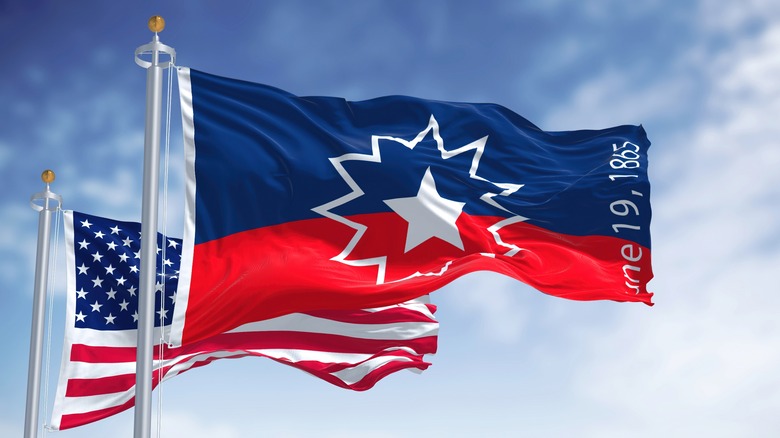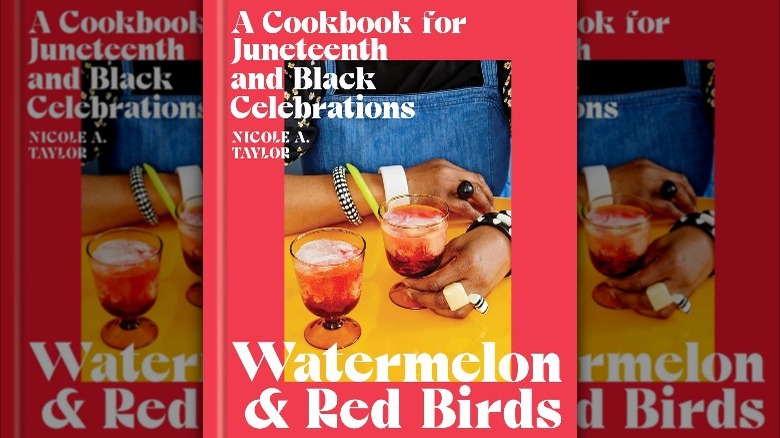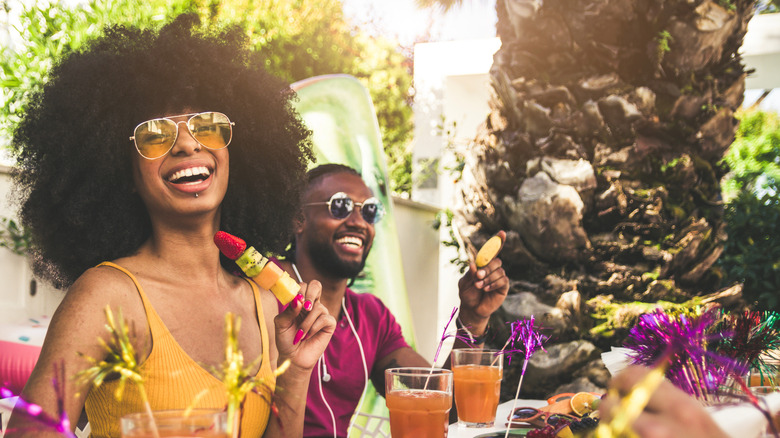This Is The First Cookbook Dedicated To Juneteenth
If you've ever observed the American holiday of Juneteenth, then you likely know that this day of celebration that's also known as Emancipation Day commemorates June 19, 1865, when the last of the African American slaves were finally freed by executive decree. According to the National Museum of African American History & Culture (NMAAHC), President Abraham Lincoln's 1863 Emancipation Proclamation could not be enforced in states still under Confederate control, so it wasn't until this date in 1865 — when about 2,000 Union army troops marched into Galveston Bay, Texas — that the more than 250,000 enslaved African Americans in that state were finally freed.
Juneteenth, as the day of celebration came to be called, was first observed by Black Americans the following year, and, since then, has become an annual celebration of importance, marked by parades, picnics, festivals, and — of course — food (via Britannica). Declared a Texas state holiday in 1980 and a federal holiday last year, Juneteenth hasn't had an entire cookbook dedicated to it until now. Published last month by Simon & Schuster, "Watermelon and Red Birds" is the James Beard Award-nominated food writer Nicole Taylor's third cookbook, and it's an ode to Juneteenth, containing more than 75 festive recipes for the day, as well as historical information about the holiday and a resources guide to sourcing some of Taylor's favorite Black-owned food products (via The Red & Black).
The importance of the color red to Juneteenth
If you're celebrating Juneteenth this year, you might want to snag a copy of food writer Nicole Taylor's ode to the important holiday. "Watermelon and Red Birds," according to the author's interview with The Red & Black, is informed by Taylor's own celebrations of Juneteenth and contains a treasure trove of drinks, main dishes, salads, and desserts that would be right at home among any Juneteenth spread.
Taylor explained to the outlet that the red fruit and red birds in the book's title are that color for a reason. Traditionally, red foods and drinks have always been served on Juneteenth, in recognition of some of the African cultures who were enslaved in America: From punch to hibiscus tea to red beans to red velvet cake, these foods are a nod the importance of the color red to the Yoruba people of Nigeria, Benin, and Togo, and the Kongo people of Angola, the Democratic Republic of the Congo, the Republic of Congo, and Gabon (via Oprah Daily).
"I grew up never knowing that connection, but there was always a red punch at celebrations, so the red is definitely a nod to the drinking ritual, tradition and the ties of Black people globally," Taylor told The Red & Black. "But some would say it's also symbolic of sacrifice and blood shed during the transatlantic slave period and Black people in America now, so there's so many meanings around the color red."
Taylor's recipes range from a sweet potato spritz to a devil's food icebox cake
Beyond the red and pink foods and drinks featured in "Watermelon and Red Birds," food writer Nicole Taylor's new cookbook contains a range of festive recipes. She told The Red & Black that a holiday glut of sweet potatoes inspired a simple syrup based on the tubers, which in turn made its way into an amaro and sprinkling white wine spritz. Other recipes cited by the book's publisher include Peach Jam and Molasses Glazed Chicken Thighs, a Radish and Ginger Poundcake, and a Southern-ish Potato Salad. As Taylor told The Washington Post, the recipes in the book are not traditional soul food recipes, but rather modern takes on the ingredients you often find in those preparations. "I wanted to make sure that fruits and vegetables from the African American table were in this cookbook in a way that you don't typically see," she said.
As she has for more than a decade, Taylor plans to celebrate Juneteenth this year, and hopes that her readers will, too. "In these times where so much is going on around us, we should lean a little bit more into Black joy because it can be resistance, but more importantly, it can be a healing balm for ourselves and for each other," she told The Washington Post.


